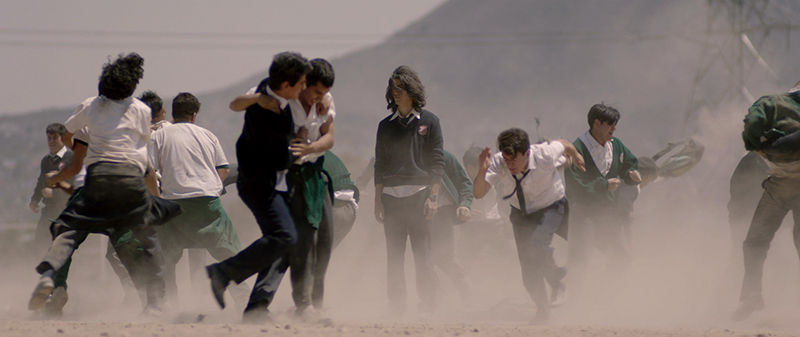Sundance Film Review: This Is Not Berlin
LGBTQ+
This Is Not Berlin (Esto no es Berlín)
Sundance Film Festival
Director: Hari Sama
1980s Mexico City punks subvert the trope of “sex, drugs and rock n’ roll” in This Is Not Berlin. Artsy post-punk kids intrigue Carlos (Xabiani Ponce de León) and Gera (José Antonio Toledano) with their dangerous-feeling scene at the club they long to get into, the Azteca. It’s the venue at which Gera’s older sister, Rita (Ximena Romo), fronts her Patti Smith–meets–Asylum Party band night after night. After school, their futbol-player clique seeks out fights with gangs of rival high schools and bump heavy metal in the car, blowing off the steam of wayward machísmo. But Carlos has a thing for Rita, and the people they want to be around are the queer, youth-culture, avant-garde vanguard of the Azteca. This Is Not Berlin unfolds Carlos’ coming-of-age tale, which is a loosely autobiographical representation of that of director Hari Sama (according to his Sundance 2019 SLC pre-screening remarks on Jan. 29, 2019).
This Is Not Berlin introduces Carlos as an aspiring engineer of sorts. Under the tutelage of his cool uncle Esteban (Sama), he learns how to fix and build small machines, and repairs Rita’s surly boyfriend’s synth. This earns them entry to the Azteca, where they throw back beers, network with the hip kids and, for Carlos, bask in Rita’s allure as she weaves through singing and prose poems with a political bent atop coldwave instrumentation. Nico (Mauro Sánchez Navarro), the relatively older but still young proprietor of the club, first wants Carlos’ and Gera’s first dalliances with the Azteca to be their final ones because they’re underage. The best-friend pair keeps returning, however, and they endear themselves to the crowd of the Azteca, integrating themselves into a lifestyle of sex-driven art, hard drugs, queries of their own sexualities and political activism. Herein, the question is whether they can balance their growth into their new, volatile selves—especially Carlos.
Where Alfonso Cuarón’s 2018 success Roma takes root in the tumultuous zeitgeist of late-’60s Mexico City, This Is Not Berlin, by contrast, celebrates the (sexual and artistic) counter-cultural liberation that this permutation of the punk scene heralded in the ’80s. (Also note the coincidences of the two films’ respective autobiographical inspirations and the casting of Marina de Tavira as the mother role in each film.) Sama’s storytelling is extraordinary and transcends the trappings of typical rite-of-passage films by way of its content’s extremities. For some, Carlos’ journey may be relatable—but even so, the film’s sexy and salacious scenes conjure excitement about its anarchic spirit, considerably so when coupled with the characters’ ardor in creating and executing performance art.
I think that the full extent of how transgressive the non-normative sexuality of This Is Not Berlin is perhaps understated in the film. Amid the conservative climate of Mexico in the ’80s, homosexual acts and queer signifiers were quite risky, which Sama acknowledged in the SLC Q&A. He also asserted, however, that the way this film depicts its punky group is how the people on which it is based expressed themselves in real life. There are also tacit indicators in the film of ’80s-Mexican attitudes toward queerness via Carlos’ and Gera’s peers in the futbol crew, who refer to the Azteca as a club for “putos.” When Carlos comes to school with a buzzed side of his head and half-washed-off makeup on his face after a night at the Azteca, jocks’ and schoolteachers’ ostracization of Carlos effectively communicates not only institutional scorn but patriarchal expectations of how a man should rebel. And Carlos’ new friends and he, as provocateurs, don’t relent in the face of dogma.
The ending of This Is Not Berlin is one that only the throes of real life could inspire. The dark, artistic ethos of the characters’ environment leaves an indelible impression, a vampire bite. The ebbs, flows and fluctuations of Carlos’ relationships with those around him engulfed me—you’ll care about him, Gera and Rita through the end. Sama, his cast and his crew have created a spellbinding story of urban magic, individualism and lust with a driving noir drumbeat. This Is Not Berlin demands to be seen. –Alexander Ortega
Showtimes:
Jan. 31 // 5:45 p.m // Library Center Theatre
Feb. 1 //9:45 a.m // Holiday Village Cinema 4
